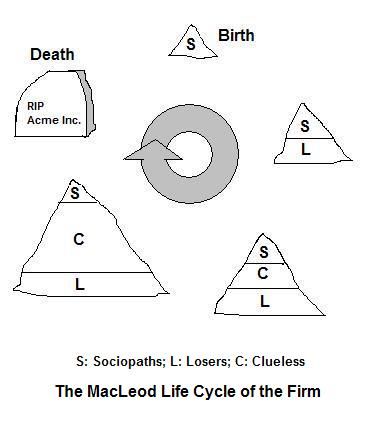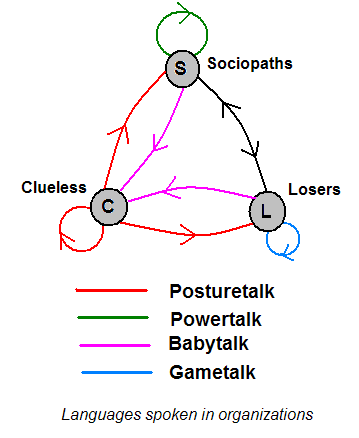The Gervais Principle at LAR
Comprehension Questions (discuss these first):
According to the reading:
- In the Loser/Clueless/Sociopath idea, what makes a Loser a "loser"?
- In your own words, as concisely as possible (one or two sentences), what are the Clueless "clueless" about?
- In the MacLeod "Life Cycle of the Firm", why are there no Clueless at the beginning, and what causes them to join? (Rao doesn't answer this directly; there is a little room for debate here.)

- Why do Sociopaths and Losers use Babytalk to communicate with the Clueless?
- What would happen if a Loser spoke Straight Talk or Gametalk to a Clueless? Why don't Sociopaths use Straight Talk with Clueless?

Describing Rao's arguments from Part III:
- In your own words, what causes "arrested-development behavior"?
- Try to briefly define "defense mechanism" in this context, using your own words. Why do defense mechanisms emerge?
- How does what you just said map on to Rao's account of Clueless motivations and behavior?
Discussion Questions:
Use specific, concrete examples whenever feasible.
- Set a timer for 2 minutes each, and have everyone answer in turn: pick an organization you've been a part of. Intuitively, do you feel like the Loser/Clueless/Sociopath frame describes that organization? Why, or why not? Are there specific colleagues or classmates you can think of that you feel fit into (or defy) these categories?
- Returning to the MacLeod "Life Cycle of the Firm", do you feel there are any categories of firms that deviate from this cycle, or exhibit different Loser/Clueless/Sociopath dynamics? If so, why?
- Rao claims:
1. Your development is arrested by your strengths, not your weaknesses.
2. Arrested-development behavior is caused by a strength-based addiction
From your personal experience (no pressure to share if you don't feel comfy; feel free to omit details) are these "Laws" true? Can you think of a time in the past where one of your strengths paradoxically led to reduced development in another area? What about the opposite?
- Rao argues that the Clueless are the least psychologically developed and most economically precarious of the 3 archetypes. Yet he also says:
Gervais has broken new ground, primarily because as an artist, he is interested in the subjective experience of being Clueless (most sitcoms are about Losers)
Why do you think the 'Clueless experience' resonated with viewers? Or do people just watch the show to laugh at Michael et al's antics?
Is it ever good or desirable to be Clueless?
- Overall, do you find the argument so far convincing? Are there things you think Rao missed, or oversimplified?